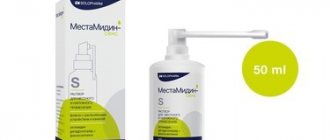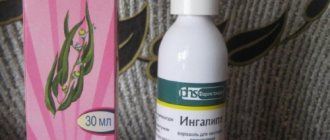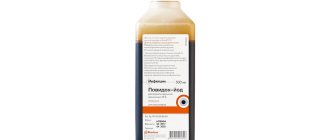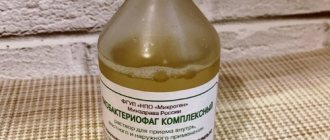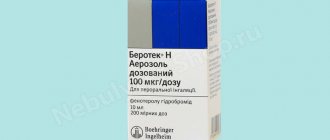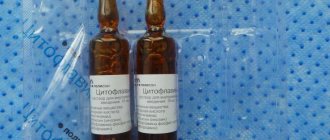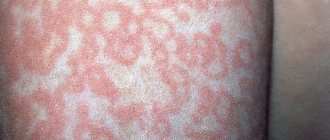Registration number: P N002916/01
Trade name of the drug: Derinat®.
International nonproprietary or generic name : Sodium deoxyribonucleate
Dosage form: Solution for intramuscular administration.
Composition: Active ingredient: sodium deoxyribonucleate – 75 mg.
Excipients: sodium chloride – 45 mg, water for injection – up to 5 ml
Description: transparent colorless liquid.
Pharmacotherapeutic group: immunomodulatory agent, hematopoiesis stimulator, regenerant, reparant.
ATX code: L03, V03AX, B03XA.
Pharmacological properties
Pharmacodynamics
The drug activates the processes of cellular and humoral immunity. The immunomodulatory effect is due to stimulation of B lymphocytes and activation of T helper cells. Derinat activates the body's nonspecific resistance, optimizing inflammatory reactions and the immune response to bacterial, viral and fungal antigens. Stimulates reparative and regenerative processes. Increases the body's resistance to infections, regulates hematopoiesis (helps normalize the number of leukocytes, lymphocytes, granulocytes, phagocytes, platelets). Possessing pronounced lymphotropism, Derinat stimulates the drainage and detoxification function of the lymphatic system. Derinat significantly reduces the sensitivity of cells to the damaging effects of chemotherapy drugs and radiation therapy. The drug does not have embryotoxic, teratogenic or carcinogenic effects.
Pharmacokinetics
Suction and distribution
The drug is quickly absorbed and distributed in organs and tissues via the endolymphatic transport pathway. It has a high affinity for the organs of the hematopoietic system, takes an active part in cellular metabolism, integrating into cellular structures. During the phase of intensive entry of the drug into the blood, redistribution occurs between plasma and blood cells, in parallel with metabolism and excretion. After a single injection, all pharmacokinetic curves describing the change in drug concentration in the studied organs and tissues are characterized by a rapid phase of increase and a rapid phase of decrease in concentration in the time interval of 5–24 hours. The half-life (T ½) for intramuscular administration is 72.3 hours. Derinat is quickly distributed throughout the body, during daily course use it accumulates in organs and tissues: maximum: – in the bone marrow, lymph nodes, spleen, thymus; to a lesser extent - in the liver, brain, stomach, small and large intestines. The maximum concentration in the bone marrow is determined 5 hours after administration of the drug. The drug crosses the blood-brain barrier. The maximum concentration of the drug in the brain is achieved after 30 minutes.
Metabolism and excretion.
Derinat is metabolized in the body. It is excreted from the body (in the form of metabolites) partially with feces, and, to a greater extent, with urine according to a biexponential dependence.
How to store Derinat at home
In any form, the antiviral drug Derinata should be stored at a temperature of +4 ... + 20 ° C in a dark place.
The best place to store the medicine is in a special compartment in the refrigerator door. Derinat should not be poured into another container. This may lead to damage to the drug. The date the medicine was opened should be indicated on the packaging.
Worst storage places:
- freezer and general chamber;
- near heating devices;
- near food;
- in the field of view of children;
- on the balcony and in the storage room.
Analogues of Derinat:
- Arbidol;
- Grippferon;
- Interferon;
- Viferon;
- Kagocel;
- IRS-19;
- Poludan;
- Ingavirin.
Indications for use
- radiation injuries;
- hematopoiesis disorder;
- myelosuppression and resistance to cytostatics in cancer patients, which developed against the background of cytostatic and/or radiation therapy (stabilization of hematopoiesis, reduction of cardio- and myelotoxicity of chemotherapy drugs);
- stomatitis induced by cytostatic therapy;
- peptic ulcer of the stomach and duodenum, erosive gastroduodenitis;
- cardiac ischemia;
- obliterating diseases of the vessels of the lower extremities, chronic ischemic disease of the lower extremities II – III stages;
- trophic ulcers, long-term non-healing wounds;
- odontogenic sepsis, purulent-septic complications;
- rheumatoid arthritis;
- burn disease;
- preoperative and postoperative periods (in surgical practice);
- endometritis, salpinoophoritis, endometriosis, fibroids;
- chlamydia, ureaplasmosis, mycoplasmosis;
- prostatitis, benign prostatic hyperplasia;
- chronic obstructive pulmonary diseases;
- pulmonary tuberculosis, inflammatory diseases of the respiratory tract.
Indications and contraindications
The immunomodulator optimally acts as a warning factor during epidemics and at the first manifestations of ill health. It is also appropriate to use it in combination with antibiotics for a runny nose, antiviral and symptomatic medications at later stages of treatment. Derinat is shown:
- for the prevention of ARVI;
- for the treatment of acute respiratory infections and acute respiratory viral infections;
- for stomatitis, thrush;
- for chronic and acute rhinitis, sinusitis, sinusitis, sinusitis, pharyngitis, otitis.
The only contraindication may be an allergy to the components of the drug.
Pregnant and lactating women are advised to coordinate the choice of medication with a doctor, but studies have proven that the drug is not dangerous in a teratogenic sense, that is, it does not cause disruption of intrauterine development of the fetus and congenital pathologies.
Which spray for runny nose and nasal congestion is best read at the link.
The description of side effects concerns mainly intramuscular injections:
- diabetics should pay attention to their blood sugar levels, as a slight decrease in levels (hypoglycemia) is possible;
- slight short-term increase in temperature.
Advantages:
- has a slight anesthetic effect;
- does not impair the quality of psychomotor reactions and concentration.
You can find a list of vasoconstrictor nasal drops in this material.
Directions for use and doses
For adults:
5 ml of solution intramuscularly over 1-2 minutes, with an interval of 24-72 hours.
For coronary heart disease - 10 injections with an interval of 48-72 hours.
For gastric and duodenal ulcers – 5 injections with an interval of 48 hours.
For cancer - 3-10 injections with an interval of 24-72 hours.
In gynecology (endometritis, chlamydia, ureaplasmosis, mycoplasmosis, salpinoophoritis, fibroids, endometriosis) - 10 injections with an interval of 24-48 hours.
In andrology (prostatitis, benign prostatic hyperplasia) – 10 injections with an interval of 24-48 hours.
For pulmonary tuberculosis - 10-15 injections with an interval of 24-48 hours.
For acute inflammatory diseases - 3-5 injections with an interval of 24-72 hours.
For chronic inflammatory diseases - 5 injections with an interval of 24 hours, then - 5 injections with an interval of 72 hours.
When using a 1.5% solution of 2 ml, intramuscular injections should be carried out daily, recalculating, until the course dose of 375-750 mg is reached.
For children:
the drug is prescribed intramuscularly according to the same regimen as for adults. For children under 2 years of age, the drug is prescribed in a single dose of 7.5 mg (0.5 ml). In children aged 2 to 10 years, a single dose is determined at the rate of 0.5 ml of the drug per year of life.
From the age of 10, a single dose is 5 ml of solution, a course dose is up to 5 injections of the drug.
Storage rules in pharmacies and clinics
According to the order of the Ministry of Health and Social Development of the Russian Federation N 706n “On approval of the Rules for the storage of medicines”, Derinata in any form of release is stored in refrigerators at a temperature of +4...+20 ° C and a humidity of no more than 70%. The drug should be located next to analogues and generics.
Large quantities of illiquid goods are destroyed at pharmaceutical factories that have a license for this. Smaller volumes are diluted with water and dispensed at a pharmacy or clinic. This is regulated by SanPinN 2.1.7.2790-10.
Transportation of the drug Derinata is carried out in special plastic or metal boxes, where the necessary storage conditions are maintained. According to Federal Law N61 “On the Circulation of Medicines” dated April 12, 2010, forwarders must have an agreement and a license for the transportation of medicines.
Pharmacists and clinic staff are required to monitor the quality and timing of medications. Improper storage or presence of expired goods without disposal certificates may result in administrative penalties. The sale and intentional distribution of counterfeit and expired goods is subject to criminal liability.
Interaction with other drugs
The use of Derinat in complex therapy makes it possible to increase the effectiveness and reduce the duration of treatment, with a significant reduction in doses of antibiotics and antiviral agents with an increase in periods of remission.
Derinat increases the effectiveness of antitumor anthracycline antibiotics and cytostatics.
The drug potentiates the therapeutic effect of basic therapy for gastric and duodenal ulcers. Derinat reduces the iatrogenicity of basic drugs in the treatment of rheumatoid arthritis, achieving 50% and 70% improvement in a number of complex indicators of disease activity.
In case of surgical sepsis, the introduction of Derinat into complex therapy causes a decrease in the level of intoxication, activation of the immune system, normalization of hematopoiesis, and improves the functioning of the organs responsible for the processes of detoxification of the internal environment of the body (lymph nodes, spleen, etc.).
Shelf life of Derinat
Release forms of the antimicrobial and antiviral drug Derinat:
- Nasal drops: shelf life – 5 years.
- Spray for topical use: shelf life – 5 years.
- Solution for local and external use, provided the bottle is intact, shelf life - 5 years, after opening - 14 days.
- Solution for intramuscular administration: shelf life – 5 years.
Expiration dates are indicated on the bottle packaging.
When the temperature changes, the active substance sodium deoxyribonuleate disintegrates. Depending on the increased or decreased temperature, the chemical process slows down or accelerates. The shelf life is reduced to 3 days.
Polidexa can be used 5-10 days before the expiration date, provided the vial is intact and properly stored.
After the expiration date, Derinat begins to evaporate.
Signs of a low-quality product:
- chips and dents on the bottle;
- poor quality text printing;
- no expiration dates;
- discrepancy between the shelf life on the cardboard packaging and the bottle;
- cloudy heterogeneous solution;
- presence of sediment;
- unpleasant smell.
After the expiration date, the drug cannot be used. It may cause a severe allergic reaction.
The long shelf life of Derinat is due to the slow disintegration of the active substance.
Price and analogues
Derinat solutions are sold only in pharmacies (prices vary from 240 to 380 rubles); No prescription required for purchase.
Given the absence of serious restrictions and a large number of positive reviews, local use of the solution is allowed for adults and children from infancy (from 0 months).
Structurally correspond to Derinat:
- Panagen;
- Deoxynate;
- Sodium deoxyribonucleate.
Means similar in principle of action and therapeutic effect:
- Grippferon;
- Anaferon;
- Viferon;
- Orvirem;
- Oscillococcinum.
Read here which drops for dry nose are more effective.
conclusions
- Medicinal products Derinat are broad-spectrum immunomodulators. They are distinguished by pronounced regenerative and hematopoietic properties and promote detoxification of the body.
- The drugs are used in all areas of medicine. In otolaryngology, their main role is the prevention and treatment of acute respiratory viral infections, as well as increasing the effectiveness of antibacterial and antiviral therapy in the treatment of acute and chronic pathologies of the ENT organs.
- The composition has no contraindications and undesirable accompanying manifestations - therefore, it is suitable for all categories of patients without age restrictions.
- The medicine is inactive against other medications and can be combined with any antiviral drugs for colds, except for fat-based ointments.
- The solution is available in forms that expand the possibilities of use. Available without a prescription.
